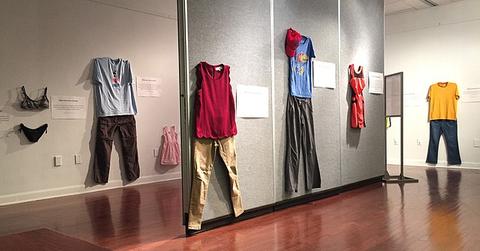
“What Were You Wearing?” Exhibit at University of Kansas
By Kayla DaviesSept. 20 2017, Updated 8:50 p.m. ET

The University of Kansas challenges this bullshit theory with their exhibit called, “What Were You Wearing?” Often times when we think of rape someone idiotically speculates about what the victim was wearing that led them to being sexually assaulted. The exhibit shows 18 different outifits that were donationed based off of victims’ descriptions of what they were wearing during their sexual trauma. Next to each outfit is each survivor’s story and how their outfit impacted them. From T-shirts and cargo pants, to exercise outfits as well as children’s clothing to emphasize youths who have been sexually assaulted.
Reporter Heidi Stevens of the Chicago Tribute, went to the exhibit and interviewed the directior of the university’s Sexual Assault and Education Center, Jen Brockman. Brockman stated, “We’re hoping students can see that this narrative they’re fed — that someone’s clothing causes sexual violence — is false.”
Here are a few of the descriptions and stories next to the clothing:
“A black skirt and red sweater,” one description reads. “They were my roommate’s; she let me borrow them for my date. I was so excited. I really liked him. I thought he was a nice guy. But when I said slow down and cried, he didn’t stop.”
Next to a male’s T-shirt and cargo shorts: “It’s funny; no one has ever asked me that before. They ask me if being raped means I’m gay or if I fought back or how I could let this happen to me; but never about my clothes.”
People who have not been raped or sexually assaulted tend to point their finger at the victim, and shame them for what they wear. When we put on our clothes we do not look in the mirror thinking, “Gee I wonder if this outfit will get me sexually assaulted today.” We wear things because we like them and it is never the victims fault for being raped. I hope exhibits like the one allows outsiders to physically and mentally put themselves in the victims shoes, and realize that it was never their fault. There should be justice when people are sexually taken advantage of after saying, “No.”

